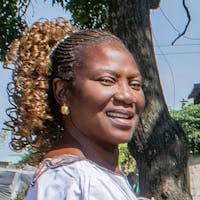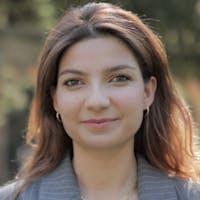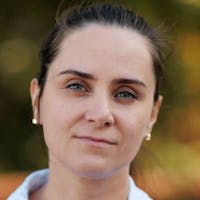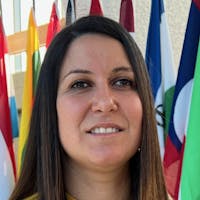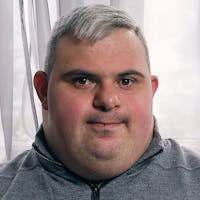In 2020, when I was 13, my family’s world turn upside down. My parents had taken out a loan for my sister’s wedding. A few months later the COVID-19 pandemic hit, schools temporarily shut and my father fell ill. We had to borrow even more money to pay for my father's treatment. Because of this, my parents couldn’t afford to pay my school fees and I didn’t go back to school when it re-opened.
Instead, I went to work with my mother at a mica processing unit to help earn extra money. We weren’t paid very much. My mother and other workers tried asking for better wages, but without success. They were paid US 6 cents per kilo. Together, my mother and I would make USD 1.5 – USD 3 a week. I got paid less for the work I did because I was a child.
At the mica processing unit women sort through baskets of mica flakes. Mica is a dust mineral used in cosmetics, paints and electronics.
© ILO/OITAt the worksite there wasn’t anything to protect us from the mica dust, and it made me cough and vomit. We worked seven days a week. If we fell sick, we didn’t get paid. It was difficult work.
At the worksite there wasn’t anything to protect us from the mica dust, and it made me cough and vomit.
Suman KumariStudent
The worksite managers mistreated and humiliated us. I didn't feel respected, or that they even saw me as a person. My mother felt helpless, she didn't want me subjected to that kind of treatment but she couldn’t do anything to change it.
I didn’t like going to the worksite, but I had no other choice. I missed studying and playing with my friends.
Suman Kumari with her mother and other members of her family.
© ILO/OITLast year, I heard about a children’s club “Balmanch”, from my friends who had started going to school. I wanted to join them too, but my parents weren’t sure about it. The people working at Balmanch talked to my parents about the benefits of me going to school rather than working. They explained how working from a young age would keep us trapped in poverty and how Balmanch could support my education and help me towards the future I dreamed of.
Eventually, Balmanch helped me to enrol in school again. I received books and supplies for school from a scholarship. I am back in school with my friends, and I am happy.
Suman Kumari and other children at Balmanch children’s club in her community. So that Suman could catch up on her education, Balmanch helped her access online lessons and provided study materials.
© ILO/OITI still go to Balmanch and look forward to seeing everyone there. Balmanch taught me life skills and my rights as a child and helped me catch up with the teaching that I missed.
When there are problems in a family, I’ve seen that it’s the girls who stop school first, not the boys.
Suman KumariStudent
The organization that supports Balmanch also helped my parents. They were taught how to cultivate vegetables so they could earn an extra income without having to rely solely on the mica work. They were also given safety training and some protective equipment so that the work processing the mica did not make them sick.
My mother now grows many vegetables including tomatoes in her kitchen garden.
© ILO/OITMany of the children at Balmanch are girls. When there are problems in a family, I’ve seen that it’s the girls who stop school first, not the boys. My father had his education stopped in grade 8, and my mother never went to school, because of the difficult conditions they grew up with.
My dream is to become a police officer. I also want to go and work and live in a big city.
Suman KumariStudent
My father is better now, and he's back at work. I try to help my mother with housework and am teaching her to write her name. Although she didn’t go to school, my mother keeps a record of the house expenses and uses a mobile phone.
My parents want me to continue my studies and go to college. My dream is to become a police officer. I also want to go and work and live in a big city.

